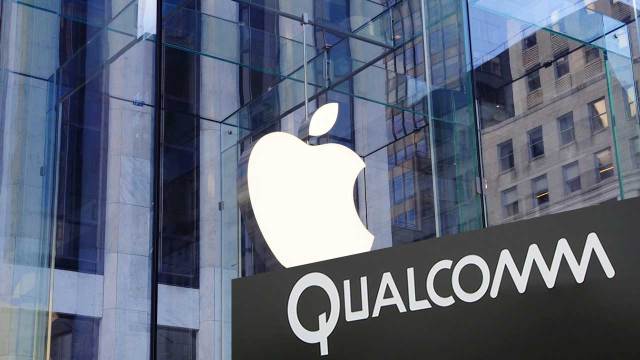The Apple-Qualcomm legal battle that began about five months ago just stepped up a few notches, with Apple now saying that some of the chip maker’s patents are “invalid” because they either conflict with existing patents or were “inessential for cellular communication.”
Of note is the fact that it has been Qualcomm’s practice to apply for patents as a bundle, which sometimes includes patents that may not be essential to cellular communications.
Apple’s response on Tuesday were directed at Qualcomm’s accusations that the iPhone maker was mischaracterizing its business. The chip maker has sued several contract manufacturers working with Apple for allegedly withholding royalty payments despite using its technologies in iPhones and iPads.
Qualcomm, meanwhile, has clearly said that the iPhone wouldn’t exist were it not for key cellular communications technologies that the company had developed, and agreed to license to Apple.
To complicate matters further, a recent Supreme Court ruling says that a patent-holder can not hold the rights over a product after it has sold the product. Apple clarified their position on the May ruling, stating that Qualcomm’s business model violates that ruling because they not only sells their chips, but also ask for royalties to be paid on the technologies used in those chips.
Qualcomm has already issued a formal statement via its Chief Counsel, Don Rosenberg:
“Apple is trying to distract from the fact that it has made misleading statements about the comparative performance of its products, and threatened Qualcomm not to disclose the truth. But Apple’s bigger distortions come in its depiction of Qualcomm’s technological contributions to Apple’s mobile products as well as our licensing practices for that technology. Apple says Qualcomm’s innovations are limited to technology implemented in the cellular modem, when Apple knows well that Qualcomm has been the de facto R&D arm of the industry. Qualcomm’s patented inventions make possible not only connectivity and high-speed data transmission across mobile networks, but also high-precision GPS navigation, app store operations, power management and battery efficiency, mobile video including advanced compression, graphics, camera imaging and facial-recognition technology, audio quality and audio file compression, and much, much more.
Qualcomm’s innovations are at the heart of every iPhone and enable the most important uses and features of those devices. It simply is untrue that Qualcomm is seeking to collect royalties for Apple innovations that have nothing to do with Qualcomm’s technology. Moreover, the per-device royalty Qualcomm charges Apple’s contract manufacturers for the right to use our licensed technologies in the iPhone is less than what Apple charges for a single wall plug.
As Apple recently acknowledged it is rarely first to market with any new technology, which shows it is relying heavily on the R&D investments in the most revolutionary technologies by companies like Qualcomm. We are confident these truths will prevail in our legal disputes with Apple.”
The gist of this legal confrontation is that Apple deems Qualcomm’s royalty model as being unfair, and based on patents that are not related to cellular communications technologies. And that’s where the chip maker takes a different stance, saying that they’re not being paid what they’re due, and that the royalties they charge are more than fair, hence the reference to the wall plug.
The way things stand, the mud-slinging is likely to continue until there is a ruling in favor of one company over the other. But it might not be that simple. Legal proceedings in such matters could take several months, if not longer. Both companies are very dependent on each other, since Qualcomm gets volume sales as well as royalties, and Apple gets the technologies it needs for its contract manufacturers to make more iPhones.
Watching this patent-based disagreement play out is going to be a riveting experience, to say the least. Will Apple prevail? Will Qualcomm be forced to waive royalties in light of the new Supreme Court ruling? Or will Qualcomm’s claims be upheld, forcing Apple’s manufacturing partners – Compal Electronics Inc., Foxconn Technology Group, Pegatron Corp. and Wistron Corp. – to pay up?
Stay tuned as we keep our fingers on the pulse of yet another patent-centric dispute that Apple has gotten itself into.
Thanks for visiting! Would you do us a favor? If you think it’s worth a few seconds, please like our Facebook page and follow us on Twitter. It would mean a lot to us. Thank you.



